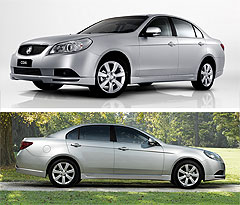Make / Model Search
New models - Holden - Epica - sedan rangeEpica’s ray of hopeAustralia's next model: The Epica gets its first facelift after just 16 months. Holden strives to revive moribund Epica with a facelift, more safety and a diesel18 Jul 2008 HOLDEN has been quick to give its slow-selling Epica a comprehensive makeover in a bid for the mid-sized sedan to live up to its lofty name. Out goes the oddball manual-only 2.0-litre in-line six-cylinder petrol engine and in comes a variation of the 2.0-litre four-cylinder turbo-diesel found in the strong-selling Captiva SUV. Now in Holden showrooms, the Epica now comes with a standard six-speed automatic gearbox with Holden’s Tiptronic-style Active Select shift pattern, six airbags and electronic stability control – at no increase to the prices of the corresponding outgoing EP models. The diesel – which costs $2000 more than the petrol equivalent – is a 2.0-litre single overhead cam 16-valve four-cylinder unit featuring a Bosch common-rail system with direct-injection and is Euro IV emissions-compliant. Like the Epica, the engine is made by General Motors Daewoo Auto and Technology (GM DAT) in South Korea, but was devised and developed in collaboration with Italy’s VM Motori engineering group.  It produces 110kW of power at 4000rpm and 320Nm of torque at 2000rpm – the same as the 1.9-litre CDTi unit found in the Opel-sourced Holden Astra small car. It produces 110kW of power at 4000rpm and 320Nm of torque at 2000rpm – the same as the 1.9-litre CDTi unit found in the Opel-sourced Holden Astra small car.The diesel’s combined fuel consumption figure is 7.6L/100km whereas the 2.5-litre petrol engine in its new six-speed auto guise manages 9.3L/100km (the same as the old five-speed auto). Power and torque outputs (115kW at 5800 revs and 237Nm at 2600rpm) also remain the same. You will spot the Epica by its smoother appearance, thanks to a new grille and rear valance, while the alloy wheels have also come in for a restyle. Drivers are more likely to appreciate a steering column that now telescopes and tilts. A redesigned flip-out key fob, the inclusion of standard rear parking radar on the better-equipped CDXi models and the introduction of heated front seats as part of the $2000 Leather Pack option complete the MY09 Epica upgrade. Although launched here in March 2007, the Epica is not a new car as the front-wheel drive platform dates back to the 1997 Daewoo Leganza. The petrol engine has stayed largely the same, but the chassis has been modified significantly along the way, while the exterior styling was also overhauled. As with the Captiva, Holden’s engineers have further revised the Epica’s steering and suspension tune for Australian conditions and tastes. This included developing different spring and damper rates, as well as working with tyre manufacturers to select the right rubber. Epica sales were only 1332 for the first half of 2008 and it trails Ford’s well-received but significantly more expensive Mondeo range (2518 sales this year), let alone Toyota’s top-selling locally built Camry (11,771) and Aurion (11,387). The Epica-versus-Mondeo sales scenario is interesting as Holden ditched the slow-selling Opel-built Vectra in favour of the Korean-built Epica, in order to lift its game in the mid-sized market with a far more price-competitive vehicle, while Ford has had no choice but to import the Belgian-built Mondeo. On the other hand, against its Korean compatriots, the Epica is well ahead of the Hyundai Sonata (657 sales) and Kia Magentis (350).
Read more:First look: Holden has high hopes for EpicaAll new models Alfa Romeo Alfa Romeo Abarth Abarth Alpine Alpine Alpina Alpina Audi Audi Aston Martin Aston Martin BMW BMW Bentley Bentley Chery Chery Brabham Brabham Chrysler Chrysler Chevrolet Chevrolet Cupra Cupra Citroen Citroen DS DS Dodge Dodge Fiat Fiat Ferrari Ferrari Foton Foton Ford Ford Great Wall Great Wall FPV FPV Haval Haval GWM GWM Honda Honda Holden Holden Hyundai Hyundai HSV HSV Isuzu Isuzu Infiniti Infiniti Jeep Jeep Jaguar Jaguar Lamborghini Lamborghini Kia Kia LDV LDV Land Rover Land Rover Lotus Lotus Lexus Lexus Maserati Maserati Mahindra Mahindra McLaren McLaren Mazda Mazda Mercedes-Benz Mercedes-Benz Mercedes-AMG Mercedes-AMG Mini Mini MG MG Nissan Nissan Mitsubishi Mitsubishi Pagani Pagani Opel Opel Porsche Porsche Peugeot Peugeot Ram Ram Proton Proton Rolls-Royce Rolls-Royce Renault Renault Saab Saab Rover Rover Smart Smart Skoda Skoda Subaru Subaru SsangYong SsangYong Tesla Tesla Suzuki Suzuki Toyota Toyota Volvo VolvoMotor industry news |
|
||||||||||









Facebook Twitter Instagram